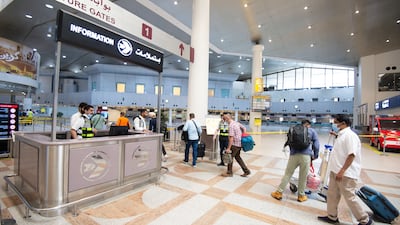Officials from Kuwait’s interior ministry met their counterparts from the ministries of communication, justice and transport to discuss enforcing utility bill and traffic fine payment by expatriates.
New rules will ensure expats pay their bills before they can exit the country.
Last week, the Kuwaiti Interior Ministry confirmed that, effective August 19, expats, who make up 70 per cent of Kuwait’s population, must pay their traffic fines in full regardless of the reason for leaving the country.
“The Ministry of Interior announces that it will take the necessary measures to collect the outstanding debts based on the decree number (17/1959) for expatriates residence law and decree number (67/1976) regarding traffic,” the ministry said.
Following that announcement, the combined Ministry of Electricity, Water and Renewable Energy confirmed it would follow suit and mandated that all expats must clear their electricity and water bills before exiting the country.
Payments can be made through the “mew-pay” online platform, the Sahel app for government e-services, or the customer service office at the T-4 terminal of Kuwait International Airport, the ministry said.
According to a government source, ministry officials will continue to meet and discuss the necessary regulations this week to enforce the new laws.
This will also include linking the intra-ministry systems with passport control at Kuwait International Airport in the coming week during a trial period to ensure it works effectively ahead of a September 1 deadline, when the new law regarding utility bills is enforced.
“For now, there is an continuing integration between the Ministry of Interior and the Ministry of Electricity, Water and Renewable Energy to link their systems at the airport ahead of the September 1 deadline when the new rule comes into force,” a source close to the matter told The National.
“The next phase will include all other ports of exit including land and sea borders,” the source added.
While the Electricity Ministry has not confirmed specific details on debts owed, the government has estimated that the ministry is owed tens of millions in Kuwaiti dinars' (tens of millions of dollars) worth of utility bills from expats who had left the country and absconded without having paid the balance of their bills.
The new laws will likely gain the support of MPs in parliament who will return to their ordinary sessions in October following their summer break time.
“While some critics may see this as an extreme way of enforcing another rule on expats in the country, the simple fact is that the government cannot afford to continue paying for such bills from expats who have absconded,” one former MP told The National, preferring to remain anonymous.
The International Monetary Fund said on Wednesday that Kuwait's economic recovery is continuing but risks to the oil producer's outlook "remain substantial" and gridlock between the government and parliament continues to delay reforms.
The IMF's executive board, in an assessment following consultations with the Kuwaiti government, said real gross domestic product is seen slowing to just 0.1 per cent this year after 8.2 per cent growth in 2022, mainly due to oil production cuts.


